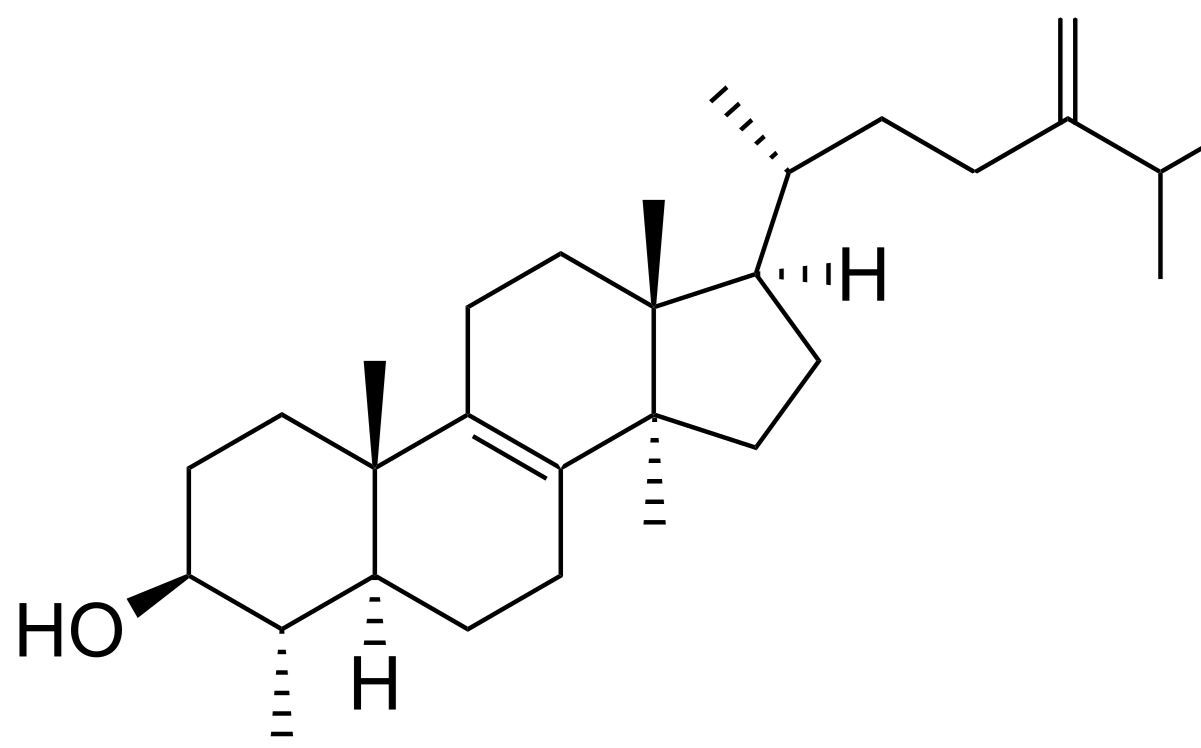
What is obtusifoliol? It's a fascinating compound found in plants, particularly in the sterol biosynthesis pathway. This molecule plays a crucial role in the production of sterols, which are essential components of cell membranes. Obtusifoliol is a type of sterol intermediate, meaning it helps in the formation of other important sterols. Why should you care about obtusifoliol? Understanding this compound can provide insights into plant biology, agriculture, and even medicine. For instance, inhibiting obtusifoliol synthesis can be a strategy to develop herbicides. Ready to dive deeper? Let's explore 30 intriguing facts about obtusifoliol that will expand your knowledge and maybe even spark a newfound interest in plant biochemistry!
Key Takeaways:
- Obtusifoliol, a plant sterol, is crucial for plant cell membrane integrity, growth, and defense against pathogens. It also has potential applications in lowering cholesterol and exploring anti-inflammatory properties in humans.
- Research on obtusifoliol's genetic regulation, sustainable agriculture, and plant-microbe interactions opens exciting possibilities for enhancing soil fertility and developing resilient crop varieties.
What is Obtusifoliol?
Obtusifoliol is a naturally occurring sterol found in plants. It plays a crucial role in the biosynthesis of other sterols, which are essential for plant cell membrane structure and function. Here are some fascinating facts about this unique compound.
Chemical Structure and Properties
Understanding the chemical structure and properties of obtusifoliol can provide insight into its functions and applications.
- Obtusifoliol has a molecular formula of C30H50O.
- It belongs to the class of compounds known as sterols, which are vital components of cell membranes.
- The compound features a hydroxyl group (-OH) attached to the sterol backbone, making it an alcohol.
- Obtusifoliol is a precursor in the biosynthesis of more complex sterols like cholesterol and ergosterol.
- It has a molecular weight of approximately 426.72 g/mol.
- The compound is relatively hydrophobic, meaning it does not dissolve well in water but is soluble in organic solvents.
Biological Role in Plants
Obtusifoliol is not just a chemical curiosity; it plays significant roles in plant biology.
- It is involved in the biosynthesis pathway of phytosterols, which are crucial for plant cell membrane integrity.
- Obtusifoliol acts as an intermediate in the conversion of cycloartenol to other sterols.
- The compound helps in maintaining the fluidity and permeability of plant cell membranes.
- It is essential for the growth and development of plants, influencing processes like cell division and elongation.
- Obtusifoliol also plays a role in plant defense mechanisms against pathogens.
Applications in Research and Industry
Obtusifoliol has various applications in scientific research and industry, making it a compound of interest beyond plant biology.
- It is used as a biomarker in studies of plant sterol metabolism.
- Researchers utilize obtusifoliol to understand the biosynthesis pathways of sterols in plants.
- The compound is studied for its potential role in developing new agricultural chemicals.
- Obtusifoliol can be used in the synthesis of other sterols in laboratory settings.
- It has potential applications in biotechnology, particularly in the engineering of sterol biosynthesis pathways.
Health and Nutritional Aspects
While obtusifoliol is primarily a plant compound, it has implications for human health and nutrition.
- Phytosterols, derived from compounds like obtusifoliol, are known to lower cholesterol levels in humans.
- Consuming plant-based foods rich in sterols can contribute to cardiovascular health.
- Obtusifoliol and its derivatives are being studied for their potential anti-inflammatory properties.
- The compound may have antioxidant effects, helping to protect cells from damage.
- Research is ongoing to explore the potential anticancer properties of phytosterols, including those derived from obtusifoliol.
Environmental Impact
Obtusifoliol also has environmental significance, particularly in the context of plant ecology and agriculture.
- It plays a role in the adaptation of plants to different environmental conditions.
- The compound can influence the resistance of plants to environmental stressors like drought and salinity.
- Obtusifoliol is involved in the interaction between plants and soil microorganisms.
- It may affect the composition of plant root exudates, which in turn influences soil health.
- Understanding obtusifoliol's role in plants can help in developing more resilient crop varieties.
Future Research Directions
The study of obtusifoliol is an evolving field with many exciting possibilities for future research.
- Scientists are investigating the genetic regulation of obtusifoliol biosynthesis in plants.
- There is interest in exploring the potential of obtusifoliol in sustainable agriculture practices.
- Researchers are studying the compound's role in plant-microbe interactions to enhance soil fertility.
- Advances in biotechnology may enable the manipulation of obtusifoliol pathways to produce valuable sterols more efficiently.
Final Thoughts on Obtusifoliol
Obtusifoliol, a lesser-known sterol, plays a crucial role in plant biology. Found in various plants, it contributes to the synthesis of essential compounds. This sterol helps plants adapt to environmental stresses, making it vital for their survival. Its unique structure and function have piqued the interest of scientists, leading to ongoing research. Understanding obtusifoliol can provide insights into plant resilience and potential applications in agriculture. By studying this compound, researchers aim to develop crops that can withstand harsh conditions, ensuring food security. Obtusifoliol's significance extends beyond plants, as it may offer benefits in medicine and biotechnology. As research progresses, the potential uses of this fascinating sterol continue to expand. So, next time you think about plant biology, remember the importance of obtusifoliol and its impact on our world.
Frequently Asked Questions
Was this page helpful?
Our commitment to delivering trustworthy and engaging content is at the heart of what we do. Each fact on our site is contributed by real users like you, bringing a wealth of diverse insights and information. To ensure the highest standards of accuracy and reliability, our dedicated editors meticulously review each submission. This process guarantees that the facts we share are not only fascinating but also credible. Trust in our commitment to quality and authenticity as you explore and learn with us.
